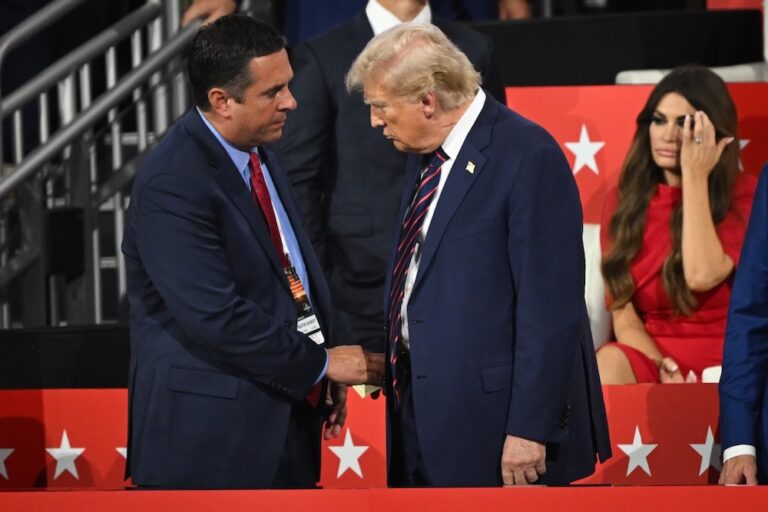(RSF/IFEX) – RSF has condemned the actions of the United States (U.S.) military authorities. On 7 October 2003, the authorities made U.S. reporters visiting the U.S. naval base at Guantanamo Bay, Cuba, sign a statement in which the reporters undertook not to ask questions about investigations that are underway at the base or risk removal […]
(RSF/IFEX) – RSF has condemned the actions of the United States (U.S.) military authorities. On 7 October 2003, the authorities made U.S. reporters visiting the U.S. naval base at Guantanamo Bay, Cuba, sign a statement in which the reporters undertook not to ask questions about investigations that are underway at the base or risk removal from the base.
Two days after the incident, a U.S. official in Washington said the requirement was about to be rescinded. This was not the first time that the military authorities have obstructed the work of journalists in Guantanamo on “operational security” grounds.
“These restrictions are unacceptable as they quite simply prohibit journalists from doing their job,” RSF Secretary-General Robert Ménard said. “Unfortunately, the strict supervision of reporters is the rule rather than the exception at the Guantanamo base,” Ménard said. The base houses a detention camp where suspected Al-Qaeda members and their Taliban allies are being held.
“Using the pretext of the fight against terrorism, these measures have the effect of limiting the appearance of reports which could give rise to further criticism of the U.S. administration,” Ménard added.
RSF said it hoped the U.S. administration will confirm that this new restriction on asking questions has been dropped. The organisation also urged the administration to improve work conditions for journalists at the base, so that legitimate security concerns are not an obstacle to their work.
In previous cases of obstruction, equipment was taken from a BBC television crew working for the current affairs programme “Panorama” on 20 June 2003, while the room of a crew from the Italian television station RAI 1 was searched on 11 September 2002.
Forbidden to ask questions
In the 7 October incident, the Associated Press (AP) agency reported that three journalists from AP, “The New York Times” newspaper and Fox Television were forced to sign the statement before boarding a flight from Jackson Military Air Base, Florida, to Guantanamo.
“Asking questions or perspectives about ongoing and/or future operations or investigations can result in restricted access [to] Gitmo [Guantanamo], removal from the installation, and/or revocation of DoD [Department of Defence] press credentials,” the statement said.
Asked why the journalists were being made to sign the statement, Lt. Col. Pamela Hart said, “Why ask a question that you’re not going to get an answer to?” She added that the measures helped in “protecting the integrity of the investigation.” The three journalists were the first group of media professionals to travel to Guantanamo since the arrests of a military chaplain and two interpreters, one of whom has been accused of spying.
On 9 October, a U.S. Defence Department official, speaking on condition of anonymity, told the Reuters news agency that the ban on asking questions was at the point of being lifted.
Previous cases
In the 20 June 2003 incident, military authorities separated a BBC crew from a group of journalists visiting the Camp Delta detention centre in Guantanamo, seized its sound equipment and erased recordings in which prisoners could be heard shouting questions to the journalists. Reporter Vivian White, who had responded to questions from detainees asking if the visitors were journalists, was confined to a building at some distance from the camp.
“The Guardian” newspaper quoted a U.S. officer as saying the BBC crew had to surrender its sound tapes in order to continue shooting video. A military spokesperson said the BBC journalists violated a ban on talking to detainees. According to the U.S. authorities, the ban was imposed in order to comply with the Geneva Conventions, but the International Committee of the Red Cross (ICRC) disputes this claim.
The room occupied by the Italian television crew in Guantanamo was searched on 11 September 2002 when it was suspected they had filmed in an unauthorised area.
Other reporters who visited the base in 2002 said they were increasingly restricted in their activities. “Miami Herald” reporter Carol Rosenberg said reporters were always escorted and their contacts with base personnel, including civilians, were monitored. AP reporter Paisley Dodds said access to the hospital and the possibility of seeing the prisoners became more difficult during 2002 and an almost total ban on taking photographs was imposed on “operational security” grounds.
The publication of the photographs of 20 detainees being treated in a degrading manner upon their arrival at the Guantanamo Bay base in January 2002 drew criticism in many parts of the world. Following the experience, the Pentagon cited “security reasons” for banning the news media from covering the transfer of detainees from Camp X-Ray to Camp Delta, both in Guantanamo Bay, a few months later. Coverage of the construction of Camp Delta was also restricted.


